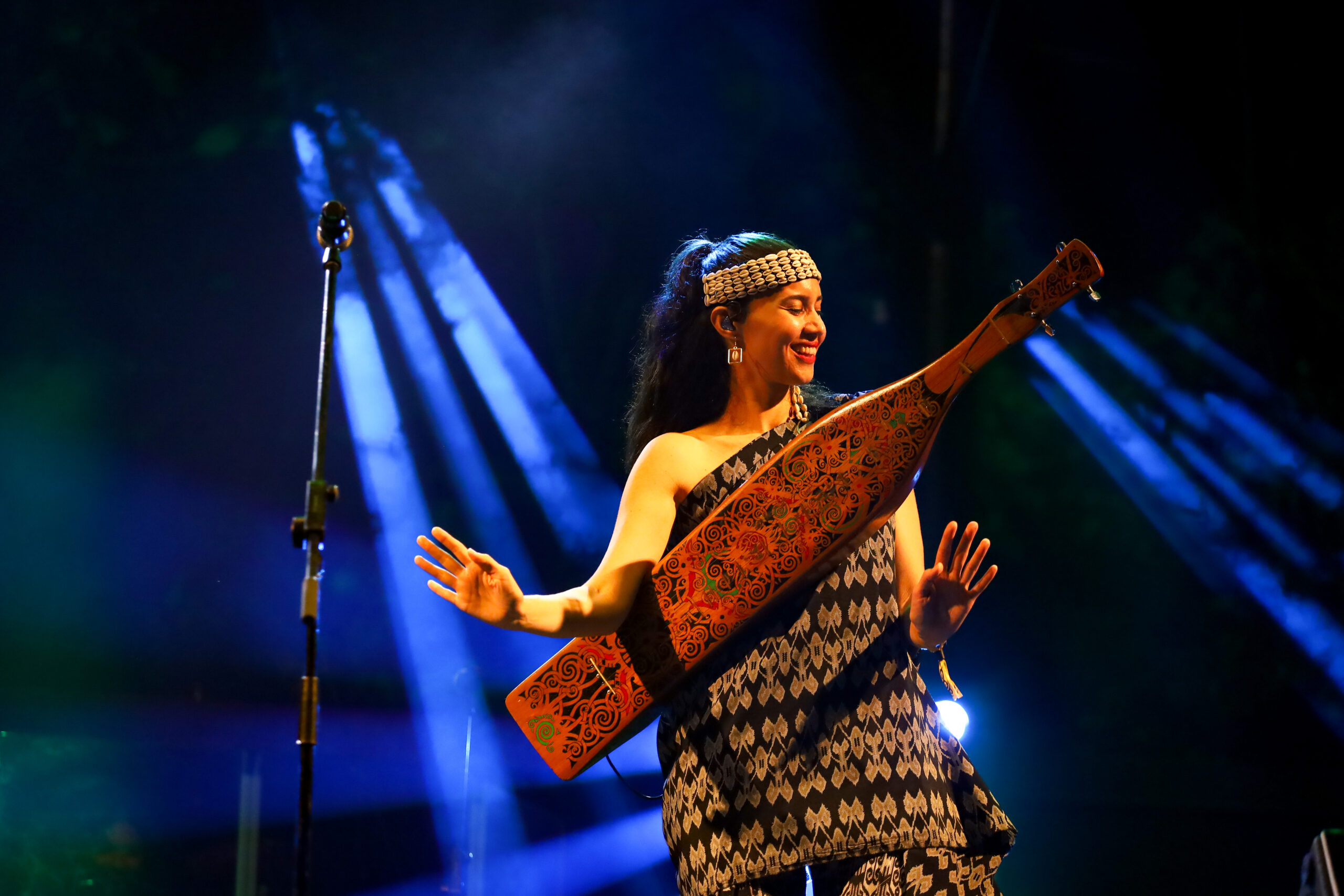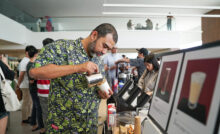BiG Feature : Sape Ni?


Photo credit: @iserazakphotography
Does tradition have a place in a modern world? We look at how indigenous Borneo musicians are keeping their cultures alive through a resurging interest in traditional music knowledge and instruments.
When one thinks of traditional music from Borneo, there are very few images involving the modern person that lives in the city. Yet for indigenous musicians hailing from Borneo, the incorporation of ‘old’ and ‘new’ is driven largely by their own desires to explore the rich tapestries of their oral traditions and stories in the way they know best. For Alena Murang, cultural preservation is a term she tries to avoid. “I think it has a connotation of living in the past or sitting in a certain period of time. For example, I think that’s what archives and museums are for, to preserve artefacts or what have you. For me or for us, I believe that culture is thriving and that culture is what it is now. If we think back to what my great grandmother would have sung, it was very much contemporary for her time.” Songs would change across generations, adapting lyrics or adjusting rhythms to reflect the essence of a song’s meaning in contemporary times – this adaptive nature also seen across the Kelabit clothing, she observed. “What I’m doing is singing for our generation, and honouring my generation as ourselves but also maintaining some elements of old songs,” she added. From humble beginnings learning from Sape Master Mathew Ngau to enchanting fans worldwide with her blend of contemporary and traditional sape-based music, Alena Murang is perhaps the island’s most famous musical export. She offered her perspective on making music that incorporates and heavily relies on traditional instruments and melodies.
Compared to many modern sape players, Alena has remained with the traditional pentatonic scaling that comes from only having four strings on the traditional string instrument. “I think I made that conscious choice not to include more notes, because I want to keep that recogniseable sound of the sape. But when we write songs and I play in a band, I’m always very intentional that the other instruments should complement it,” she explained, adding that earlier on in her career she would have to adapt the sape to fit the pop music genre. In her own band, where she regularly collaborates with her cousin (who is also Kelabit), she is conscious of the sape as the lead and other instruments being complementary to it. Case in point, her latest single ‘Warrior’ is a high-powered rock song that is evidently contemporary in nature. The combination with traditional sape inflections creates a sound that is distinctive and wholly hers, and recogniseable to any Kelabit person. Ethnofusion band Tuni Sundatang, approaches its music from the aspect of instrument revival and survival.
Originating from frontman and music researcher Simon McFreddy’s passion to revive the two-stringed traditional musical instrument called sundatang or gagayan that appears in many Bornean tribal cultures like the Rungus, Dusun and Murut, his discoveries led him to adapt the sundatang instrument itself to appeal to modern music lovers and instrumentalists. “A band like Tuni Sundatang exists to open the minds of those who have lost faith in musical instruments like this sundatang (across Borneo). In fact, this idea led me to Kalimantan to continue my studies and give awareness to the indigenous communities about the importance of continuing this tradition.” With traditional music becoming repopularised in mainstream culture, Simon is thrilled with its direction and affirms its relevance in the current generation. These instruments, he says, have become symbols of identity for indigenous people citing the famous bands of Hu and Oytken, from Mongolia and Siberia Russia respectively. “Maybe we will be able to give birth to a band that fights for the traditional music of Borneo… today’s value that we can see from the community is traditional and modern music combined becomes a booster or an injection of enthusiasm for the new generation. We see many young people start to be interested in traditional performances, not only from music but in terms of clothing and dance as well. So it is clear here, (that it’s) starting to gain a place in the hearts of the young.”
As Sabah and Sarawak seem to be more forthcoming in the way traditional indigenous music is consumed or popularised in mainstream culture, Elisha Tiga, a Dusun-Murut from Brunei and frontman of the exploratory jazz band, Elisha Tiga Music Eksperiment (ETX), said he saw a ‘missed opportunity’ in the gap of modern indigenous music exploration and cultural preservation in Brunei (the re-invocation of which Elisha identified as still being in its infancy), saying that “we can only continue to study, break down and re-explore these artefacts in the pursuit of understanding and discovering new philosophies in music making”. He added that this philosophical approach gave him the confidence to move forward making new work that was “not only just ‘imitations’ of tradition but are conveying ‘newer’ traditions” that the listener would recognise currently, albeit through traditional art-forms. Another variable that poses a challenge is the nature in which this tribal music comes from. Their animistic backgrounds hold current day taboos that makes exploring and “digging deep” into these pieces undesirable in Brunei, hence only allowing the simple act of performing them at a surface level.
“The biggest difference, which is also the biggest challenge when creating newer compositions, has always been the melodic aspect of the piece”. ETX merges traditional instruments like the sape and gulintangan with jazz; he says he hasn’t come across others in the country covering tribal fusion in a similar scope and hopes there will be others soon. “I believe there is a misconception that you need to be at a very high musical level to start exploring tribal heritage and reimagining them. The larger in life display from extremely talented individuals makes for an amazing spectacle in order to put tribal heritages in the modern limelight yet it also creates the misconception I mentioned earlier.” He expressed his own tendency against manipulating original tribal song melodies saying that with much of the tribal music he’s worked with, “the melody plays a crucial role in creating familiarity as these musical notes have been part of local culture for generations. Having knowledge of their melodic tendencies and scales proved helpful. Unfortunately, it takes more than an academic analysis in order to create melodies that are steeped in the same spiritual traditions from generations before”.
Nursalim Yadi Anugerah, a multi-instrumentalist and composer from Pontianak, Kalimantan, is known and loved worldwide for his own sonic experimentations of cultural practice, knowledge, and cosmology of indigenous people and their socio-cultural and environmental activism in Kalimantan-Borneo. He’s travelled the world sharing Dayak culture with his audiences and sets are often filled with visceral representations of Kalimantan’s tribal heritage like the Dayak ‘Aso’ motif, or the deforestation that is taking place on lands traditionally owned by indigenous peoples. A multi-instrument sound rooted in traditional instruments, works together to convey the stories and traditions of West Kalimantan’s indigenous. Nursalim released ‘Selected Pieces from HNNUNG’ through an up-and-coming progressive cassette label from Bandung, Hasana Editions; Selected Pieces is described as a chamber opera which “amplifies the cosmic dramaturgy of Kayaan culture, in which the narrative of matriarchy is essential”. It was coined the next year as one of 2018’s best Indonesian albums by the Jakarta Post for its “captivating listening that is never easy without sounding alienating”. Nursalim is also said to work closely with traditional musicians on a variety of original and interpretative pieces – the Balaan Tumaan Ensemble and Kerumbin Choir, both from Kalimantan, who feature heavily on Selected Pieces, are another fine example of the way Bornean musicians in the modern digital age are creatively documenting their lives.
Recent Posts
Immerse in the Spirit of Ramadhan in Brunei
Sponsored by Brunei Tourism As the holy month of Ramadhan graces Brunei, the country transforms…
BiG Buzz : MANTAP Poised to Boost Brunei Food Economy and Security
Written by Aliyah Ming & Ying Chia [gallery size="full" columns="1" ids="25822"] The entry of Mantap…
BiG Buzz : Take Off to Balikpapan with Royal Brunei
[gallery size="full" columns="1" ids="25813"] After a 24-year hiatus, the Brunei-Balikpapan direct flight has made a…
BiG Buzz : 1, 2, 3, KOPI!
[gallery size="full" columns="2" ids="25837,25838,25839,25840"] How much coffee can you drink? Well, at the 7th annual…
BiG Buzz : Grass is Greener Here
[gallery size="full" columns="1" ids="25832"] [gallery size="full" ids="25831,25834,25833"] The importance of sustainability has been a pressing…
BiG Buzz : Borneo Jazz is back!
[gallery size="full" columns="1" ids="25400"] Get ready for a jazzy good time as the Borneo Jazz…


